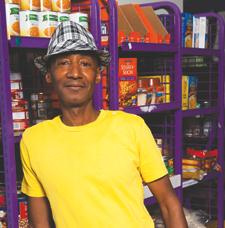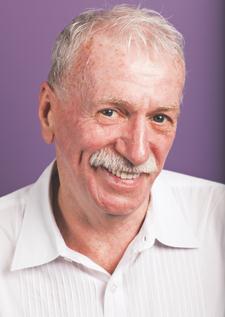
Kevin Borden. Credit: Adam Coish
When Bill Handley started working with the Toronto People with AIDS Foundation, “we had funding for the Food Bank; it was for the food bags and things like that. We were not allowed to buy any food or we would lose funding.” Handley became PWA’s programs and services coordinator in 1994, in charge of the Food Bank and a number of other programs. At the time, PWA received most of its food through the non-profit charitable organization Daily Bread, a support hub for the food bank community. Problems arose with Daily Bread’s rationing system; PWA’s portion was decreased because the organization reasoned that many PWA clients would also have access to drop-in centres and women’s and youth shelters that Daily Bread was already supplying. Handley had to seek outside help, eventually securing resources from Second Harvest, another provider, and Food for All Street Kids, a now-defunct independent food bank. Until Handley left in 2005, if the PWA Food Bank needed more supplies, the only thing they could do was appeal to the community. “If we wanted food we would work the clubs,” Handley says. “If I needed something like Kraft Dinner or whatever, we would do fundraisers. If you needed something you would have to go and do it yourself.”
Kevin Borden took over as PWA’s food programs coordinator in 2007. “One of the reasons they brought me in was to try to build on what was already successful, and to bring it up to modern days and times,” Borden says. One of the main goals was to remove any potential stigma that might be attached to accessing a “food bank.” He spent the first two years researching food bank models in the US. After surveying their clients, PWA changed the name to The Essentials Market. The distribution system was also changed, from a hamper program where volunteers would put together food packages and give them to each client. “They had no choice, no say, nothing like that,” Borden says. “A little degrading. Just making people feel like they were getting a handout.” This restructuring and rebranding turned the Food Bank into something more like a store, where clients come in, take a cart, and are able to select the products they want and need. “Again, a sense of empowerment, a sense of normality, like they’re just shopping like they would shop anywhere else,” Borden says. “We’re not kidding ourselves; it is a food bank, but the bottom line is that we try to create a more welcoming space where we try to make it more comfortable for them.”
Borden sits on the board of Daily Bread and describes its relationship with PWA as vastly improved. “They encourage us, as well as the other 178 food banks in the city, to get additional donations if we possibly can. We get a lot of community support: Woody’s, all the bars, MCC, TICOT. We’re partnered with people like Whole Foods, who do a lot for us, and we also partner with Fresh Co.”
Handley, who has returned to PWA as a case manager for benefits and assistance, recalls a time when the organization was staffed by seven, the food bank was no bigger than his current office, and they were serving 25 to 35 clients a week on very few resources. “If you needed something, you went out in the community and got it,” he says. “Everything’s really streamlined now.” The changes allowed the Food Bank to thrive; it now serves approximately 750 clients a month, with programs that offer meal supplements, assistance to those who are street-involved, assistance to primary caregivers, and more, all free to PWA clients. For Borden, one of the most exciting initiatives, finally coming to fruition after two years of planning, is three gardens in which organic fruits, vegetables and herbs are grown and then filtered back to the market. This means money can go toward buying other perishables. There are other benefits as well, Borden explains: “A lot of our participants are isolated, don’t like big crowds, so it’s a great place for them to go and work with the earth, get next to nature, and have solitude and still feel like they’re contributing to the community.”


 Why you can trust Xtra
Why you can trust Xtra


